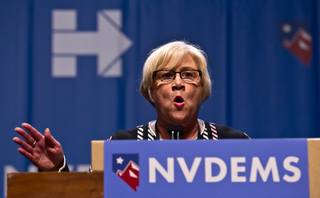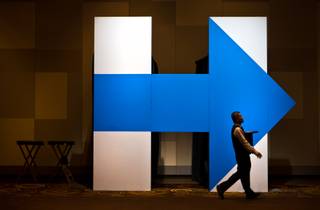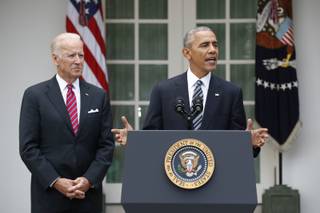
Evan Vucci / AP
President-elect Donald Trump smiles as he arrives to speak at an election night rally, Wednesday, Nov. 9, 2016, in New York.
Wednesday, Nov. 9, 2016 | 2 a.m.
Related news
There was one man who spoke to the frustrations of the American people like no other this election cycle.
The pundits and prognosticators thought he had no chance. They thought he would never win his first caucus in Iowa. They thought he definitely wouldn’t win the Republican nomination. And they were certain that he wouldn’t become president.
They were proved wrong Tuesday night, when New York businessman Donald Trump was elected the 45th president of the United States.
A sea of Republican supporters, many of them donning “Make America Great Again” caps, packed into the bar and restaurant in the lobby of Trump’s glistening gold skyscraper that towers over the Las Vegas Strip to watch the results of the election roll in. They killed time ordering Miller Lites and cocktails as it initially seemed improbable Trump would win.
But as states were called — from Iowa to Wisconsin — the crowd grew more expectant. They chanted “Trump, Trump, Trump” and called on the president-elect to make good on his promise to “drain the swamp.”
The folly for Democrats this election cycle was in underestimating Trump’s support from white, middle-class America, coupled with a backlash against the political establishment.
Marty Bennett, 58, said he registered as a Republican for the first time this year and voted for Trump to “end the terror of Democrats,” in an interview outside of his polling place in central Las Vegas Tuesday morning. He pointed specifically to the scandals that had marred Clinton’s campaign, from her use of a private email server to the attack on the U.S. consulate in Benghazi.
“I’m tired of the Democrats and what they’ve done,” Bennett said.
Adding insult to injury for Democrats, Republicans held onto control of both the U.S. Senate and U.S. House of Representatives, too.
The one silver lining for Democrats in the whole thing? Nevada.
They won the battle even as they lost the war.
It was a bittersweet night at a Democratic party at the Aria, where 500 or so volunteers and staff gathered to watch the results of the election roll in. If 2014 was the year of the red wave, then 2016 was Nevada’s blue wave, with Democrats sweeping offices up and down the ticket.
Despite losing the presidency, Clinton carried Nevada by a narrow, 2-point margin, a testament to the dedication of her staff on the ground, the mobilization of union resources, and a diverse electorate that seemed determined to reject Trump and his rhetoric. Nevadans made history electing former state Attorney General Catherine Cortez Masto as the first Latina to the U.S. Senate and state Sen. Ruben Kihuen as the first Latino congressman from Nevada.
Former synagogue leader Jacky Rosen eked out a win over Republican businessman Danny Tarkanian early Wednesday morning. And further down ballot, Democrats took back control of the state Senate and Assembly from Republicans.
“You all told me we were going to turn Nevada blue, and we did,” Cortez Masto said in her acceptance speech late Tuesday night. “You should be very proud of what we did in Nevada today.”
She also thanked retiring U.S. Sen. Harry Reid, whom she will replace when she takes office in January, for his support throughout the campaign. Reid did not make an appearance at the Democratic watch party Tuesday night, though it was the machine he built that filled the Strip ballroom on election night.
“He has done so much for Nevada,” she said. “This Democratic victory here in Nevada is possible because of him. This is his night, too.”
So how exactly did Nevada buck the trend of the nation?
For one, Democrats were able to successfully mobilize the Hispanic community.
The night before the election, a largely Hispanic crowd gathered outside a Mexican grocery store in east Las Vegas to hear Los Tigres del Norte, the popular norteño band, pitch them on the importance of voting.
On Friday, hundreds waited in line at a polling site inside that same grocery store, Cardenas Market, for two hours after polls were supposed to close on the final day of early voting. Democratic operatives rushed over, urging voters not to leave before casting their ballots.
It worked. Of the three days that early voting site was open, Friday had the highest turnout, with 1,904 ballots cast. Two-thirds of the total votes cast at Cardenas were by Democrats.
Luz Perez, a 34-year-old preschool teacher from North Las Vegas, was one of those Democrats who voted early for Clinton. She was back at the grocery store on Monday to do some shopping when she saw the rally outside.
“I feel this election is very important for Latinos. A lot of Latinos don’t want Donald Trump,” Perez said. “Put away all the other stuff he has said about Latinos — we want a president that helps our children to know respect.”
When all was said and done, 81 percent of Hispanics swung for Clinton compared to only 16 percent for Trump, according to exit polling conducted by the polling firm Latino Decisions. Hispanic voters accounted for 18 percent of voters in the state.
The Hispanic community was able to make a difference in Nevada in the way it couldn’t in a state like Florida, which has a dense concentration of Hispanics in urban Miami but a whiter population scattered across the state, or Arizona, a Republican state where Latinos make up a growing share of the population.
But Clinton’s campaign also had the infrastructure to mobilize that diverse electorate to the former secretary of state’s advantage. The threads weave back well over a year ago, when Clinton’s staff landed on the ground in Nevada essentially as soon as she announced her campaign in April 2015.
The campaign’s plan included reaching out early to Hispanic voters in Nevada, a population that has rapidly expanded over the past few decades. They made up about 28 percent of the state’s residents last year, up from 20 percent in 2000.
Clinton’s campaign recruited a handful of bilingual, Hispanic organizers to reach out directly to the Latino community and build relationships — through cafecitos (small-group outreach), Latino-to-Latino phone banks and neighborhood canvassing. They cultivated bonds with prominent figures in Nevada’s Hispanic community, including activist Astrid Silva, one of the best-known Dreamers in the country.
Ahead of Nevada’s Democratic caucus in February, Silva and other local Dreamers endorsed Clinton over her opponent in the primary, Vermont Sen. Bernie Sanders. Silva later spoke in support of Clinton at the Democratic National Convention, sharing her story of being smuggled on a raft across the Rio Grande at age 4, and starred in one of Clinton’s ads.
By comparison, Trump built his campaign on the promise of building a wall at the U.S.-Mexico border and on deporting the 11 million immigrants in the country without authorization.
“When Mexico sends its people, they’re not sending their best,” Trump infamously said in his speech announcing his bid for the presidency. “They’re bringing drugs. They’re bringing crime. They’re rapists. And some, I assume, are good people.”
It was a message that resonated with Americans who believed immigrants were coming to the U.S. and taking away their jobs. It even resonated with some Hispanic voters in Nevada.
At his first Las Vegas rally in October 2015, Trump pulled one of his enthusiastic supporters, Colombian immigrant Myriam Witcher, up onstage. “This is my relationship with Hispanics,” Trump told the crowd.
Witcher, who was a frequent fixture at Trump’s Las Vegas rallies and local campaign headquarters, liked his message on immigration, saying that she came to the country legally and that others should have to wait their turn.
But for every Witcher, there were many more who felt alienated by Trump’s message.
Voter after voter in a largely Hispanic, low-turnout neighborhood in east Las Vegas said they couldn’t see themselves supporting Trump when they canvassed late Friday afternoon. A Democratic organizer was out to make sure they would turn up to the polls to support Clinton instead.
Just pulling into her driveway, 38-year-old Maria Ruiz said most of her coworkers at the California Hotel, where she works in the count room, were voting for Trump. But she said she couldn’t ever see herself voting for him and that she was excited to vote for Clinton as the first female president.
At another house, 25-year-old Andres Covarrubias, a guest-room attendant at the SLS, said he was going to vote Democratic down the ticket.
“I don’t want my people to be deported. I’ve seen the commercials and all that stuff,” Covarrubias said. “I don’t really trust him.”
House after house, it was the same message.
“She’s not going to build the wall,” said 56-year-old metalworker Simon Terrazas, about why he was voting for Clinton.
The Hispanic vote was only one piece of the electoral puzzle in Nevada, but it spoke to the sweat Democrats put into preparing for 2016.
Take, for instance, the politically powerful Culinary Union, a critical Democratic organizing force that represents 57,000 hotel workers on the Las Vegas Strip and across the state. To ensure Democrats were elected up and down the ballot, 150 union members in Las Vegas took a leave of absence from their jobs to work as political organizers.
The union also registered more than 34,000 members (60 percent of its membership) to vote, and 52 percent of them cast their ballots in the two-week early voting period before Election Day. The Culinary also ran a series of citizenship drives at the beginning of the year to help more than 2,200 legal residents apply for citizenship in time to vote.
“This is a fight between the rich, powerful people and the working people,” said secretary-treasurer Geoconda Arguello-Kline at a canvass kickoff last week. “We want to win. We want to win Ruben, Catherine, Hillary; we want to win everybody.”
In total, the union knocked on 350,000 doors before the general election and made contact with 74,000 voters, the majority of whom the union was able to turn out during Nevada’s early voting period.
“I think the Culinary Union made the difference in Nevada,” said the union’s political director Yvanna Cancela late Tuesday night. “Our ability to organize led us to deliver more than we ever have in an election before.”
Other progressive groups, like Battle Born Progress, conducted their own get out the vote and canvassing efforts outside of the Democratic Party infrastructure, specifically targeting demographics typically underrepresented in the voter population.
“Here in Nevada we did what we needed to do. We brought it home,” said Annette Magnus, executive director of Battle Born Progress. “Progressives got out the vote.”
Trump’s campaign struggled to match that kind of infrastructure from the beginning. Leading up to the caucus, Trump only had one paid staffer in Nevada, state director Charles Munoz.
With those limited resources, the campaign still managed to put 5,000 people through its caucus and convention training starting late last year, drawing a number of volunteers who were getting involved with a political campaign for the first time.
Trump’s campaign relied heavily on the Republican National Committee, with its nine offices and 67 paid staffers in the state, for institutional support. The Trump campaign shuttered its Las Vegas office after the caucus, not to reopen another until late August. Meanwhile, Democrats ran 16 coordinated campaign offices in the state.
All along, Trump’s campaign acknowledged the strength of the Democratic machine in Nevada, but promised the enthusiasm of their supporters would take the day.
“This guy’s got an army of supporters out there,” said former New York Mayor Rudy Giuliani stumping for Trump in Las Vegas on Sunday. “We’re going to see them turn out on Tuesday in numbers you probably have never seen in Nevada.”
Maybe not so in Nevada, but that’s exactly what happened across the nation.
Sun reporters Daniel Rothberg and Jackie Valley contributed to this report.




Join the Discussion:
Check this out for a full explanation of our conversion to the LiveFyre commenting system and instructions on how to sign up for an account.
Full comments policy